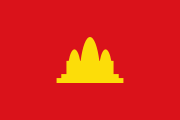Party of Democratic Kampuchea
Party of Democratic Kampuchea គណបក្សកម្ពុជាប្រជាធិបតេយ្យ | |
|---|---|
| General Secretary |
|
| Founded | December 1981 |
| Banned | 1994 |
| Preceded by | Communist Party of Kampuchea |
| Succeeded by | Cambodian National Unity Party |
| Military wing | National Army of Democratic Kampuchea |
| Ideology | Democratic socialism[1] Militarism Agrarian socialism Khmer nationalism Marxism-Leninism (Until 1985)[citation needed] |
| National affiliation | Patriotic and Democratic Front of the Great National Union of Kampuchea |
| Party flag | |
 | |
The Party of Democratic Kampuchea was a political party in Cambodia, formed as a continuation of the Communist Party of Kampuchea in December 1981.[2] In the mid-1980s, it publicly claimed that its ideology was "a new form of democratic socialism",[1] having ostensibly renounced Marxism–Leninism.[3]
According to the party, the CPK's dissolution and the PDK's formation were prompted by the need for broader unity against Vietnam, a unity that an explicit communist line would hamper. The National Army of Democratic Kampuchea was the armed wing of the party, while the Patriotic and Democratic Front of the Great National Union of Kampuchea was a mass organization controlled by it.
The party's General Secretary at the time was Pol Pot. The party led the deposed Democratic Kampuchea government. Its followers were generally called Khmer Rouge.
At the time of the formation of the PDK, the Khmer Rouge forces had been pushed back by the Vietnamese-backed KPRP government to an area near the Thai border. The PDK began cooperating with other anti-Vietnamese factions and formed the Coalition Government of Democratic Kampuchea in 1982.
Although Pol Pot relinquished party leadership to Khieu Samphan in 1985, he continued to wield considerable influence over the movement.
Ahead of the 1992/1993 elections, the PDK was largely succeeded by the Cambodian National Unity Party (CNUP),[4] which publicly stated its wish to participate in the elections but eventually did not register and vowed to sabotage the election. Subsequently, UNTAC decided not to conduct elections in areas under PDK control.[5] At the time it was estimated that approximately six percent of the population in Cambodia lived in areas under PDK control.[6]
The PDK was declared illegal in July 1994, after which its activities continued under the Cambodian National Unity Party and the self-proclaimed Provisional Government of National Union and National Salvation of Cambodia.[7]
See also
[edit]References
[edit]- ^ a b Alan John Day, Richard German, and John Campbell (Ed.). Political Parties of the World. 1996. New York: Stockton. p. 109.
- ^ Glossary - Thai / Cambodia Border Refugee Camps Website
- ^ Bogdan Szajkowski (Ed.). Revolutionary and Dissident Movements of the World. John Harper Publishing. 2004. p. 54.
- ^ Arthur S. Banks, Thomas C. Muller, William Overstreet, Sean M. Phelan, Hal Smith (Ed.). Political Handbook of the World 1999. 2000. p. 154.
- ^ CAMBODIA (Radhsphea Ney Preah Recheanachakr Kampuchea - National Assembly)
- ^ CPSR - document_view
- ^ The Europa World Year Book Volume I. Europa Publications Limited. 1997. p. 775.
Lua error in Module:Navbox at line 535: attempt to get length of local 'arg' (a number value).
- 1981 establishments in Cambodia
- 1993 disestablishments in Cambodia
- Agrarian socialist parties
- Defunct political parties in Cambodia
- Khmer Rouge
- Organizations of the Third Indochina War
- Political parties disestablished in 1993
- Political parties established in 1981
- Rebel groups in Cambodia
- Socialist parties in Cambodia
